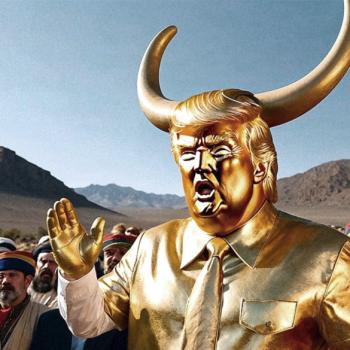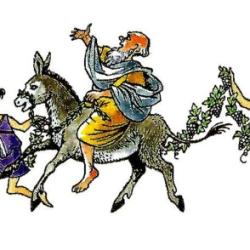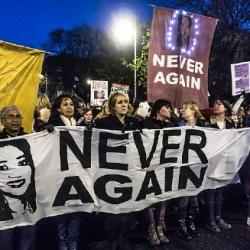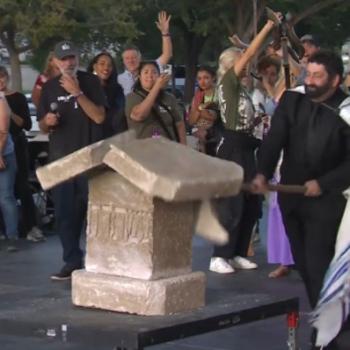As we mentioned on Saturday, there’s a generation gap between white evangelicals whose earliest memories are the 1990s and those of us a bit older who can remember the 1970s and early 1980s. Millennials never experienced evangelical Christianity that was not shaped by and for and around anti-abortion politics, but Gen-Xers and Boomers did. We remember the Before Time, and we remember watching the transformation and redefinition of our faith take place in real time.
I’ve written about this transformation and redefinition before, most notably in “The ‘Biblical View’ That’s Younger Than The Happy Meal.” But I’ve also written about it in many other places where I’ve expressed frustration with the many white evangelicals my age or older who stubbornly pretend that they do not remember the Before Time, or the weirdly jarring process of change that produced what is now the central, unchallengeable tenet of white evangelical faith. Yes, 1980 was a long time ago, but it’s not lost in the mists of time.
In a 2015 post about white evangelicalism before abortion politics, I wrote this: “Maddox, Taveras, Flynn, Mazzilli in the Mets infield; Henderson, Morales, Youngblood right-to-left; Alex Trevino catching; Swan, Zachry, Burris …” That’s the Mets’ starters from 1980. I didn’t have to look that up and that wasn’t even a good team.
 That post also included this image from Ronald Reagan’s 1984 re-election campaign ad: “There’s a bear in the woods.” That bear was not abortion, or same-sex marriage. It was Soviet Russia (and Black people).
That post also included this image from Ronald Reagan’s 1984 re-election campaign ad: “There’s a bear in the woods.” That bear was not abortion, or same-sex marriage. It was Soviet Russia (and Black people).
Or, as I put it in this post from 2019 about “The Change We All Lived Through, But Don’t All Remember“:
White evangelicals were mostly partisan Republicans in 1980, but because we were Cold Warriors, not culture warriors.
Which is to say, really, that we were partisan Republicans because of our opposition to the Civil Rights Movement who were, in 1980, still using the Cold War as our more-respectable-seeming proxy for losing that political, cultural, legal, moral, and theological argument. We had not yet become partisan Republicans because of our opposition to the Civil Rights Movement who were, by the late 1980s, using culture-war issues of abortion and gay rights as our more-respectable-seeming proxy for losing that political, cultural, legal, moral, and theological argument.
I used baseball as an illustration again in a 2020 post to point out that “This Ain’t a ‘Historical Narrative,’ It’s Living Memory.” That post was in response to David French’s willfully amnesiac response to Randall Balmer’s history of the religious right. (Given French’s latest column, that post seems particularly timely now.)
That post is also one of several times I’ve discussed a revealing artifact from the Before Time:
You don’t have to take my word for it, though. Here’s the editors of the belligerently conservative journal First Things, describing early 1980s white Christian support for Reagan in 1996: “At that time the Cold War was the dominant fact in international affairs and largely shaped domestic politics.” That’s from the introduction to the journal’s reprinting of its founder’s 1981 manifesto “Christianity and Democracy” on its 15th anniversary. That essay never mentions abortion politics. Or abortion. At all. It argues, rather, that anti-communism ought to be the No. 1 priority for good white Christian voters, and that anything else is a dangerous and irresponsible distraction from that paramount concern.
Nobody indignantly condemned Richard John Neuhaus in 1981 for failing to mention the moral horror white evangelicals were experiencing after years of legal abortion had forced them to confront the new reality of millions of “murdered babies.” Because that moral horror hadn’t yet been conjured up. White evangelicals were Cold Warriors and as long as the Cold War was a sufficient basis for their politics, theology, and identity, it wasn’t necessary yet for them to reinvent themselves as culture warriors.
I was 13 years old when Neuhaus published that essay. I was a nerdy and precocious 13-year-old, but not so nerdy and precocious as to have read that at the time. I read it years later, as part of a class when I was in seminary. I was, at that time, a lock-step “pro-life” evangelical working for a lock-step “pro-life” evangelical advocacy nonprofit and so the absence of any mention of abortion jumped out at me as a reminder of that Before Time of my childhood, back when white evangelicals didn’t care about or talk about abortion except to occasionally mention that it was best to avoid Catholic hospitals if one was going through a difficult pregnancy.
This absence of abortion was especially strange to see because by that point Richard Neuhaus himself had become a ferocious anti-abortionist. He had later latched onto the issue with the zeal of a convert — to the point of becoming a literal convert because of it. If anyone had tried to publish an essay on “Christianity and Democracy” in 1994 that failed to center abortion, never mentioned it, and suggested that it was among the many issues that mustn’t be allowed to distract us from some other decisive single issue, that person would have been attacked and anathematized and forced to recant. And Neuhaus himself would have been part of that inquisition.
But that wasn’t the main thing that struck me when I first read “Christianity and Democracy.” The main thing was surprise at how shoddy and shallow Neuhaus’ argument was. It is, above all, an explicit argument for single-issue politics. Christian political engagement, it says, should be based on finding the one, singular, Most Important Thing. Determine what that is and then make it central, decisive, absolutizing, and all-determining. Your political responsibility should consist solely of advocating for this one Most Important Thing. Your faith should consist solely of that which enables and inspires you to pursue that political responsibility. Everything else ought to be disregarded as a distraction from the essential, paramount importance of this one Most Important Thing.
Establishing that template for faith and politics is the core of Neuhaus’ argument. His selection of anti-communism as the X-factor to plug into that template is secondary.
So really what we see in “Christianity and Democracy” is an audition. White evangelicals in 1981 were in search of something — anything — that could plausibly serve as the X-factor in Neuhaus’ single-issue template. This is what they’d been searching for since 1965, or maybe even since 1954.
Anti-communism failed that audition, partly because it was not distinctly partisan enough (most Democrats were Cold Warriors too). And the timing was bad. While the Cold War was still running hot in the early 1980s, Perestroika and 1989 were just around the corner, severely undermining the utility of anti-communism as the defining feature of faith and politics.
There was also a too-strong-to-ignore case that the Civil Rights Movement was a legitimate step closer to genuine, pluralistic democracy with equal rights before the law for everyone and that this was, in a sense, the best and strongest rebuttal of the evils of totalitarian communism. Anti-communism couldn’t possibly serve as the totalizing X-factor that would enable the roll-back of the Civil Rights Movement if it was not unambiguously pointing in that direction.
Anti-communism also didn’t succeed in addressing the felt need to reclaim a mythic moral superiority. Whatever the X-factor turned out to be, it would have to address the yawning chasm of white evangelicals’ moral failure during the Civil Rights Movement. The Civil Rights Movement had been good, beautiful, and true. It was right and those who had opposed it were wrong. Everyone had seen that. Everyone knew this. White evangelicals themselves knew this. And that knowledge was unbearable.
Above all, the X-factor, the Most Important Thing would need to be a moral or moralistic issue that would allow white evangelicals to reassure themselves that they were, once again, the Good Guys they had always needed to imagine themselves to be. But in 1981, it was still hard to imagine what, if anything, might be elevated to the single-issue Most Important Thing that could possibly meet that emotional need.
In 1981, anti-abortionism still seemed an unlikely candidate because anti-abortionism hadn’t yet evolved into abortion-is-murderism and thus wasn’t yet something that could plausibly be considered as an absolutizing, paramount Most Important Thing.
And here is another piece of living memory, another change we all lived through but which many pretend not to remember: the idea that “abortion is murder” came to be white evangelical dogma because it was necessary for making this an all-determining Most Important Thing that we could pretend would allow us to vote in opposition to racial equality while still being able to tell ourselves we’re the Good Guys.

















